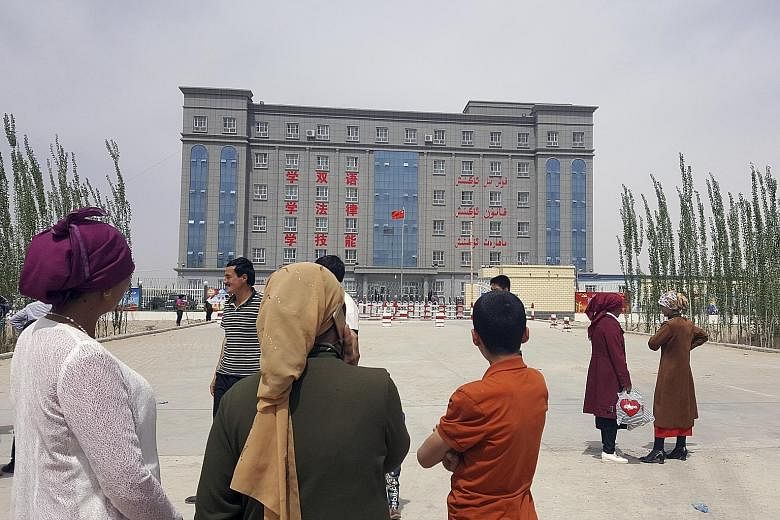BEIJING • Ms Rukiya Maimaiti, a local propaganda official in China's far west, warned her colleagues to steel themselves for a wrenching task: detaining large numbers of ethnic Uighurs and other Muslim minorities in the region.
The Chinese government wanted to purge the Xinjiang region of "extremist" ideas, she told her co-workers, and secular Uighurs like themselves had to support the campaign for the good of their people.
"Fully understand that this task is in order to save your relatives and your families," wrote Ms Maimaiti, a Communist Party functionary who works on the western edge of Xinjiang, in a message that has been preserved online. "This is a special kind of education for a special time."
Her warning is one piece of a trail of evidence, often found on obscure government websites, that unmasks the origin of China's most sweeping internment drive since the Mao era - and establishes how President Xi Jinping and other senior leaders played a decisive role in its rapid expansion.
In a campaign that has drawn condemnation around the world, hundreds of thousands of Uighurs and other Muslim minorities have been held in "transformation" camps across Xinjiang for weeks or months at a time, according to former inmates and their relatives.
Mr Xi has not publicly endorsed or commented on the camps, but he ordered a major shift in policy soon after visiting Xinjiang - where nearly half the population of 24 million are Uighurs - in 2014 to weaken Uighurs' separate identity and assimilate them into a society dominated by the Han majority, according to documents.
Hours after his visit ended, assailants used bombs and knives to kill three people and wound nearly 80 others near a train station in Urumqi, the regional capital. The attack was seen as a rebuff to Mr Xi, who had vowed to wield an "iron fist" against Uighurs who oppose Chinese rule.
Mr Xi reassigned Mr Chen Quanguo, 62, the hard-line Communist Party chief in neighbouring Tibet, to act as chief enforcer of the crackdown in Xinjiang.
"What is happening in Xinjiang is the leading edge of a new, more coercive ethnic policy under Xi Jinping's 'new era' of Chinese power," said Dr James Leibold, an expert on Xinjiang at La Trobe University in Australia who has monitored the campaign.
The Trump administration is weighing sanctions against Chinese officials and companies involved in the indoctrination camps. A bipartisan commission has singled out Mr Chen and six other officials as potential targets.
As the camps and surveillance efforts expanded, Beijing directed new funds to Xinjiang, where spending on security nearly doubled last year from 2016, to US$8.4 billion (S$11.6 billion) , according to data released early this year.
"The central level ultimately pays for all of it, so some kind of consent was certainly given," said Dr Adrian Zenz, a scholar at the European School of Culture and Theology in Germany who has studied the camps.
A broad definition of "religious extremism" - which included behaviour as simple as trying to persuade people to quit alcohol and smoking, and more serious transgressions - gave the authorities wide leeway to punish even mildly pious Muslims.
Local officials like Ms Maimaiti had little incentive to hold back; those found dragging their feet in the crackdown have been named and punished. The public has been told to prepare for a long offensive that one local official last week called a "campaign of intellectual emancipation".
The Xinjiang government decreed late last year that the security drive would last five years before achieving "total stability".
NYTIMES

